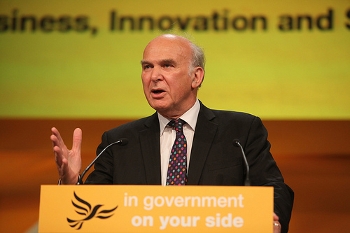 Reporting on Vince Cable’s speech yesterday at the Liberal Democrat conference, John Springford argues that while his plan to begin to address inflated executive pay is right in principle, it will be difficult in practice. To make it work, to has to get shareholders and corporate boards to agree to reduce their own pay.
Reporting on Vince Cable’s speech yesterday at the Liberal Democrat conference, John Springford argues that while his plan to begin to address inflated executive pay is right in principle, it will be difficult in practice. To make it work, to has to get shareholders and corporate boards to agree to reduce their own pay.
In Tom Wolfe’s classic novel of banker excess, ‘Bonfire of the Vanities’, Wall Street’s ‘master of the universe’ Sherman McCoy is destroyed by vengeful Fates. Driving his Mercedes in the Bronx with his mistress in tow, McCoy assumes he’s being car-jacked when some black youths approach. In his attempt to flee, he runs over Henry Lamb, a stereotypical striver in poverty but in school. Idealised youth is mown down by the ruling class. Slowly the Fates, representing different power blocs in New York Society, catch up with McCoy, destroying his career, marriage and a little piece of the American Dream.
Wolfe’s novel riffs on race and class in 1980s New York. But the central motif – that people on top are held to account by self interested people below – helps us appraise Vince Cable’s speech to the Liberal Democrat conference hall yesterday, especially his remarks on ‘responsible capitalism’ and high pay.
Crusades need willing soldiers. McCoy is destroyed because he is the representative of a WASP oligarchy, as well as corrupt man who committed a crime. African American community leaders, crusading journalists, and an ambitious district attorney advance their political causes by bringing him down.
Vince Cable, who wants to ‘start a conversation‘ about whether high pay is justified, is trying to build a similar coalition to press down on inflated salaries in the financial sector.

Bearing down on pay is right in principle, as Ian Mulheirn recently pointed out . Unfair pay, most economists argue, flows from abnormal profits that firms make by having monopoly power, by subsidies from the state, or by getting customers to pay more than their products are worth. All three forces are at work in the financial sector. The government is trying to tackle them, by opening up markets to new entrants, removing taxpayer subsidies, and making products simple and comparable. But market forces easily go AWOL in finance, giving firms power and prestige they have not earned.
However, attempts to tax this unfair pay away won’t work. The 50p tax rate snares entrepreneurs who make the economy prosperous, and whose pay can be more easily justified in economic terms. Lacking easy levers to pull, Cable needs to use moral suasion if his plan is to work. He needs to build a coalition with the corporate boards that set pay. He argues shareholders and non-executive directors should call executives’ bluff, when they threaten to push off to Geneva if their pay demands aren’t met.
In order for this to happen, boards need to believe the business won’t be damaged by more spartan pay awards. As most shareholders are themselves financiers, this means some self-reflection on their part – an attempt to evaluate whether they themselves are worth it. So Vince Cable needs to build his coalition from within the financial sector itself. Will this work? One has to doubt it. Tom Wolfe’s Furies – a lawyer, a community leader and a journalist – all could advance their careers by bringing down the masters of the universe. Do the masters themselves have the same incentive?
This article first appeared on the SMF Fringe blog on 19 September.
Please read our comments policy before posting.








You appear to be arguing for a status quo here. Cable has zero chance of convincing business leaders to reduce pay. Even after huge errors on the part of the banks, they still awarded themselves significant pay rises and bonuses. Your hypothesis concerning this is preposterous. A meaningful dialogue/consensus cannot be reached.